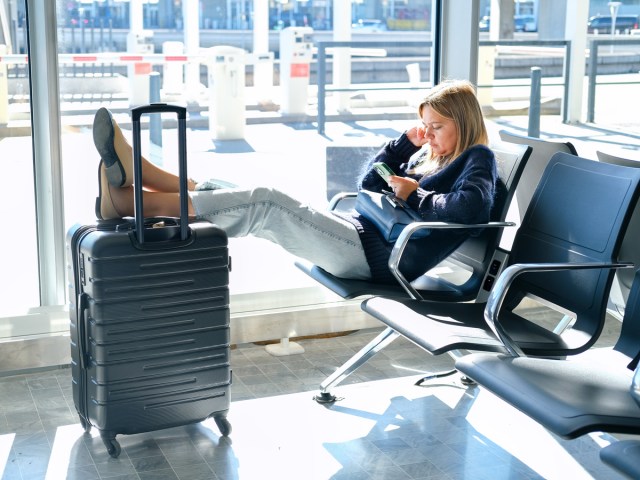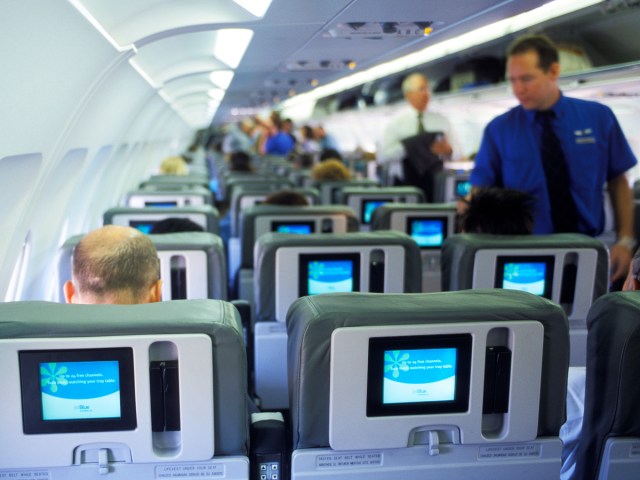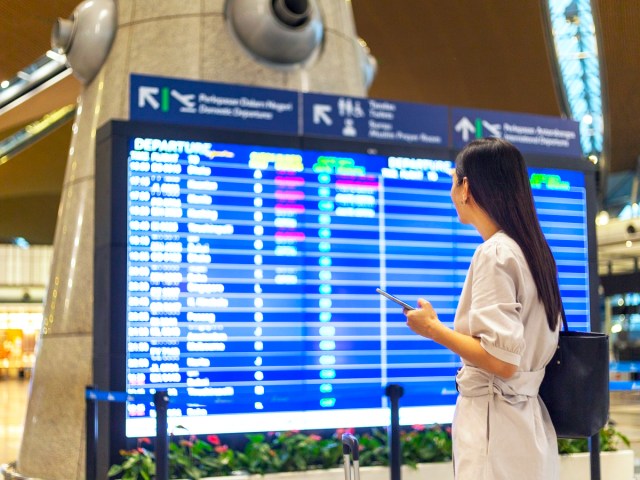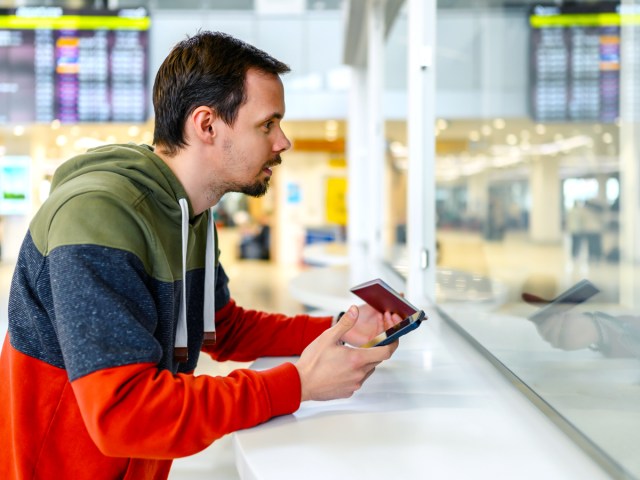Most travelers are probably used to encountering flight delays at some point during their journey. More than 20% of flights in the U.S. arrived at their destinations late in 2024, according to data from the Bureau of Transportation Statistics. But not all flight delays are distributed equally. A handful of flights experience what the U.S. Department of Transportation (DOT) calls “chronic” delays — and, for the first time, the department has ordered hefty fines on the airlines who operate them. Find out which airlines flew the most chronically delayed flights in the U.S.
What Counts as a Chronic Flight Delay?

The DOT defines a “chronic flight delay” as a flight that operates at least 10 times per month and arrives more than 30 minutes late over 50% of the time. This includes flights that are canceled or diverted for any reason, including factors outside of the airline’s control.
The department considers chronic delays to be an “unrealistic scheduling practice” and can fine airlines if they continuously operate these flights. Once chronically delayed flights are identified, the airline is expected to adjust its schedule within a specified time frame to avoid further violations.
The Bureau of Transportation Statistics has a helpful dashboard that identifies such flights, breaking it down by month and year. In the most recent available data from November 2024, these were the 10 most chronically delayed flights in the U.S.:
• JetBlue Flight 2919 from Fort Myers to Newark — 80% of flights arrived late during the month
• Spirit Flight 995 from Newark to Nashville — 76.47% arrived late
• Spirit Flight 748 from Pittsburgh to Newark — 76.19% arrived late
• United Flight 4174 from Washington, D.C. (National), to Newark — 72.41% arrived late
• United Flight 4457 from Newark to Washington, D.C. (National) — 68.97% arrived late
• United Flight 4448 from Norfolk to Newark — 68.97% arrived late
• Alaska Flight 375 from Las Vegas to San Francisco — 66.67% arrived late
• Spirit Flight 841 from Atlanta to Newark — 64.71% arrived late
• Alaska Flight 247 from Dallas to Portland, Oregon — 63.64% arrived late
• United Flight 4180 from Washington, D.C. (National), to Newark — 62.50% arrived late
JetBlue Fined for Chronic Flight Delays

On January 3, 2025, the DOT announced a $2 million penalty for JetBlue Airways for operating multiple chronically delayed flights and failing, within a reasonable time frame, to make the necessary schedule adjustments to reduce those delays. The department called this its “first-ever enforcement action for chronic flight delays” and said that half of JetBlue’s $2 million fine would be for compensating customers affected by the flight disruptions.
The department found that the New York City-based airline operated four chronically delayed flights a total of 145 times between June 2022 and November 2023. Each of these flights was considered “chronically” delayed for at least five months or more. The four flights were between New York’s JFK Airport and Raleigh-Durham, New York-JFK and Orlando, New York-JFK and Fort Lauderdale, and Fort Lauderdale and Hartford, Connecticut.
In a press release, the DOT said, “Unrealistic scheduling is an unfair, deceptive, and anticompetitive practice that disrupts passengers’ travel plans, denies them reliable scheduling information, and allows airlines to unfairly capture business from competitors by misleading consumers. Chronically delaying a flight for more than four consecutive months is one form of unrealistic scheduling.”
The DOT Sues Southwest for Chronic Delays

On January 15, 2025, the DOT took further action against both Dallas-based Southwest Airlines and Denver-based Frontier Airlines. Frontier was fined $650,000 for operating three chronically delayed flights between August 2022 and April 2023 a total of 63 times.
The action against Southwest included the first-ever lawsuit from the DOT against an airline for operating delayed flights, seeking maximum civil penalties for “illegally operating multiple chronically delayed flights and disrupting passengers’ travel.”
The two chronically delayed flights were between Chicago’s Midway International Airport and Oakland, California, and between Baltimore, Maryland, and Cleveland, Ohio. The DOT found these flights were delayed a total of 180 times between April and August 2022, and more than 90% of those disruptions were due to factors within the carrier’s control.
In a statement, then-U.S. Transportation Secretary Pete Buttigieg said, “Airlines have a legal obligation to ensure that their flight schedules provide travelers with realistic departure and arrival times. Today’s action sends a message to all airlines that the Department is prepared to go to court in order to enforce passenger protections.”
However, it’s yet to be seen whether the Department of Justice under the new administration will continue with the suit against Southwest. The airline responded with a statement to Reuters that it was “disappointed” with the decision of the DOT to file suit “over two flights that occurred more than two years ago,” saying that it completed over 99% of its flights without cancellation in 2024.
Know Your Rights for Delayed Flights

The chronic delay penalties from the DOT are part of a broader set of passenger protections introduced in recent years. Most notably, in October 2024, the department implemented new refund requirements for flight disruptions, setting a clear definition of what counts as a “significant” delay for the first time and requiring that airlines provide prompt refunds should you choose not to travel.
With the new rules, passengers are entitled to a full refund if a domestic U.S. flight is changed by three or more hours (or an international flight is changed by six or more hours) for any reason — not just “controllable” events such as aircraft maintenance or crew availability. The same goes if the flight is outright canceled.
There are also new rules concerning schedule changes that add a layover to your itinerary, delayed or mishandled bags, downgrades to a lower cabin of service, extra fees paid for in-flight services that were not delivered, and being rerouted to other airports or on other airplanes less accessible to those with disabilities.
While the DOT’s regulations apply to flights operated to, from, or within the U.S., there are similar traveler protections in other regions. For example, you’ll want to make sure to read up on EU 261 rules for flight disruptions in Europe, as passengers are required by law to receive compensation for delays or cancellations.
More from our network
Daily Passport is part of Inbox Studio, an email-first media company. *Indicates a third-party property.
















